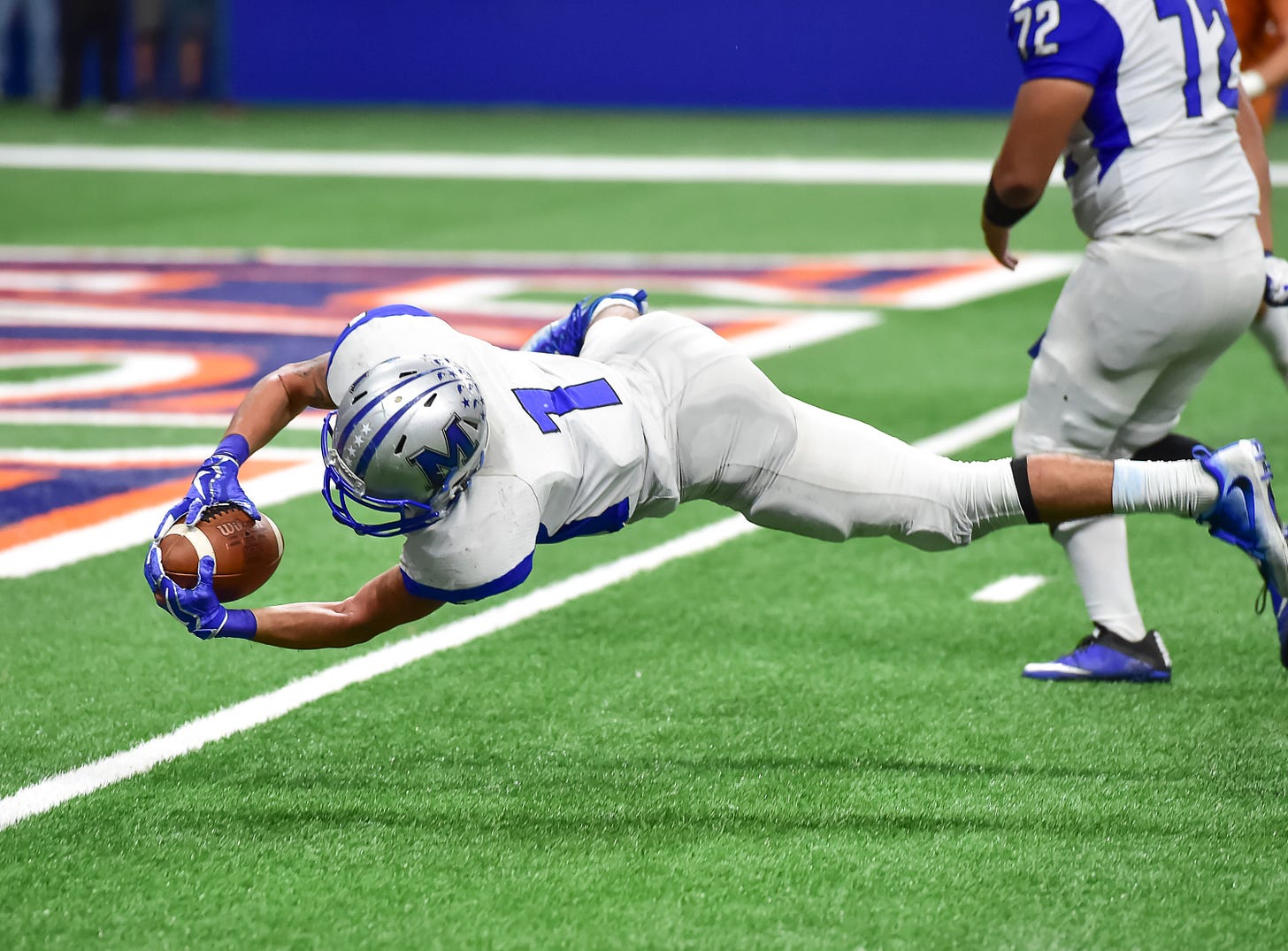Sports are popular summer camp activities. Wherever they are played, these classic games can teach about communicating and connecting at work and beyond.
In this edition, learn how high school basketball teams championed kindness. Find out why baseball players dressed as bananas encourage us to go the extra mile. Empathize with a unique bowler who reminds us to be ourselves, despite what others might say.
There are also powerful sports memories from leaders featured on The Switchboard, showing us a side of them beyond their career stories. Here are eight sports lessons learned on and off the field, court and lane:
🏀 Be Kind
🏈 Own The Reaction
🎳 Be Yourself
⚾ Go The Extra Mile
🏎️ Focus on the Details
⏱️ Manage The Clock
⚾ Foster Magical Moments
🏀 Communicate and Trust your Teammates
#1 🏀 Be Kind
This is a lesson in sportsmanship that’s relevant on and off the court. The story starts with a Texas high school basketball team in 2013. Student Team Manager, Mitchell Marcus, was devoted to the sport and the team. At the last game of the season, Coach Morales asked Mitchell to put on a jersey and surprised him — sending him onto the court for his game debut.
While his teammates passed the ball to him multiple times, Mitchell wasn’t able to make a basket. But, in the final seconds of the game, a player from the opposing team, Jonathon Montanez, passed Mitchell the ball, and Mitchell finally scored!
After seeing the story on the news, The Chancellor of Texas Tech, Kent Hance, offered Jonathan a full-ride scholarship to college for his kindness. Nine years later, journalist Steve Hartman and his kids checked in with Jonathan, who is now a coach and teacher in Texas. He shared this advice:
“Following the Golden Rule can lead you to new heights.”
#2 🏈 Own The Reaction
Toby Frankenstein offers his perspective on what football can teach us about how we communicate at work:
I'm a huge 49ers fan, and I think that football is the ultimate team sport. For a team to score, everyone on the field has to not only do their job masterfully but also to react to their teammates in real-time.
While we can't control what everyone does in a business, we can control how we react. Great communications is about owning the reaction so that we set up our colleagues for everyone to do their best.
There’s nothing quite like team training to start practicing reactions:
#3 🎳 Be Yourself
Bowling is a classic childhood pastime. It’s also a sport with worldwide competitions and rankings through the PBA — Professional Bowling Association. In GQ, Eric Wills reported on “The Man Who Broke Bowling” for his unusual technique — using two hands. Typically, only kids embrace this style when they’re learning to bowl.
But for Belmonte, it’s his favorite and most successful way to bowl, but it hasn’t been easy to forge his own path:
[Jason] Belmonte, whose 15 major titles are the most in PBA history, has been called a cheat and a cancer to an already diseased sport…But Belmonte never cowered in the face of the criticism, never deviated from his approach, and has now inspired a rising generation of bowlers to emulate his game.
#4 ⚾ Go The Extra Mile
Ken Shuman offers his perspective from the baseball diamond:
The Savannah Bananas are the team I would highlight. Jesse Cole, their founder, says, "I believe the future of business is not based on how many customers you have; it's based on how many fans you have." The Savannah Banana players and the entire organization go the extra mile to make sure their fans are engaged, having a good time, and wanting to come back again to another game.
Can you imagine building a successful corporate culture where employees go the extra mile on projects because they want to impress their co-workers and deliver a great experience? Some, like Zappos, have tried to break the mold but not many have succeeded.
Watch the team in action: Baseball that's gone bananas!#5 🏎️ Focus on the Details
The culture of a car racing team that transformed the sport and the people who worked there is the subject of this Harvard Business School Case Study: Toto Wolff and the Mercedes Formula One Team. Under his leadership, they’ve set historic records, winning 70% of the Grand Prix races
Professor Anita Elberse shares a summary in the HBR article, Number One in Formula One, emphasizing the power of leaders’ actions and communications on the success of an organization. Wolff is obsessed with setting the highest standards, starting with the bathrooms. When he visited the team’s hospitality area for the first time, he observed it was dirty and acted quickly to address it:
Wolff hired a full-time hygiene manager, Miguel Guerreiro, who now travels with the team. “I physically showed him how I wanted him to clean the toilet, how to put the brush back, how to wipe the floor, how to put the soap bottles with the front facing forward, how to sanitize the handles, and so on…
Whenever I teach the case study, we end up talking a great deal about Guerreiro and about why Wolff—with everything he is responsible for—would occupy himself at such a granular level of detail with the cleanliness of the toilets. Is he micromanaging? Perhaps. But he is doing so with clear goals: to set the highest possible standards throughout the organization, to send a message that no job is too small for even the highest-ranking executive, and to highlight that every single team member plays a part in Mercedes’s performance.
This mindset has contributed to the emergence of an organization that is obsessed with excellence—one that constantly aims to raise its standards and set the benchmark within its sport.
#6 ⏱️ Manage The Clock
Cynthia Horiguchi shares her perspective from the American football field:
Clock management is important in communications and football. (Go 49ers and USC Trojans!) You don't always have time for a methodical drive down the field. In the last two minutes of a football game, you might spike the ball and give up a play to buy time. In communications, we do the same — for example, a short holding statement is shared when time is of the essence but we don't have all the facts yet.
Some situations require a Hail Mary — the play might not be perfect, but it's better than conceding. In football, teams practice 2-minute drills and Hail Mary situations. In communicaions, the more we plan, the better chance we have of success in high pressure situations too.
#7 ⚾ Foster Magical Moments
Nathan Fisher shared his memories from watching baseball at home with family:
I'll always remember jumping up and down on our couch with my dad after Hendu hit his miraculous homer against the Angels...and of course when Dave Roberts stole second 20 years later against the Yankees.
As internal communicators, the challenge is to help create magic moments for our employees that we might all still remember years later. But I don't know how any of us would ever top the 2004 Boston Red Sox.
#8 🏀 Communicate and Trust Your Teammates
Laney Erokan shares memories of her hometown team and what they taught her from a young age:
Before the reign of the current Golden State Warriors' Splash Brothers, there was Run TMC — the giants from my childhood, Chris Mullin, Tim Hardaway, and Mitch Richmond. For a Bay Area basketball-playing kid, I felt like the luckiest girl that I got to see them play often (Warriors tickets were around $20) in the 1989-90 season and I lived 20 minutes a way. I made my dad a fan too (so he’d go to the games with me). I learned so much from that magical trio — how to have fun while doing something so hard, what a team looks like, and how you can’t win all on your own.
Their story can teach us that anything is possible with a strong leader who encourages communication (Don Nelson, the best head coach ever), and not a single person can be successful without trusting your teammates. You have to know that the pass is coming from Hardaway so Mullen can make the layup; and working to develop your own team’s style, drive, and motivations will take you further than you could imagine; and you need a diverse group to have a successful world view — Tim, Chris, and Mitch couldn’t have been more different in background, size, speed, and specialty — and it worked better than anything.
⚾ Batter Up
Most of all, I hope these sports stories help you hit a home run at work and in life with the way you communicate and connect with others. Waving from my home of the Brave(s)!
Thank you to Toby Frankenstein, Ken Shuman, Cynthia Horiguchi, Nathan Fisher and Laney Erokan for contributing your thoughts to this article.
The Switchboard’s Leaderboard
Show your support by referring friends to this newsletter. Earn rewards in return.
Thank you for reading The Switchboard. ☎️ Every edition is personally written by me — Julia Levy. Learn more about why I write. Review the Index of past posts.
If you enjoyed this article, consider sharing it, giving a heart below ❤️, commenting or posting on LinkedIn, Threads or Twitter.
🏕️ This edition is part of The Switchboard's Summer Camp series. Join for joy, creativity and inspiration. Happy Summer!








